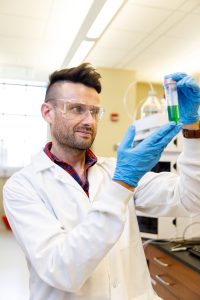
TUSCALOOSA, Ala. — Biological research at The University of Alabama will assist the emerging hemp industry in the state by examining the plant’s chemical make-up.
In a recently signed agreement with UA, The Wemp Co. will sponsor Dr. Lukasz M. Ciesla, UA assistant professor of biological sciences, to analyze the hemp the company grows. The company operates a 20-acre hemp farm in Dallas County, Alabama, and it is one of 200 licensed growers of industrial hemp by the state.
“Hemp is a new agricultural product in the state of Alabama, and the industry is not sure how the climate and soil make-up of the state is going to impact the levels of certain chemicals,” Ciesla said. “We are excited to fully characterize the product to contribute to a program with great potential to enhance the regional economic system.”
The Agriculture Improvement Act of 2018, or Farm Bill, declassified hemp as an illegal drug, deeming hemp as an agriculture commodity that can be grown, processed and handled only by those with licenses from the Alabama Department of Agriculture and Industries.
This legislation defines hemp as all parts of the cannabis plant containing less than 0.3% of the chemical tetrahydrocannabinol, or THC, including derivatives, extracts and cannabinoids. THC is the main psychoactive chemical in marijuana.
Hemp is in a range of products, most notably cannabidiol, or CBD, a popular health supplement. Not a regulated medication, CBD supplements can be made up of most any chemical, but they cannot contain more than 0.3% of the psychoactive chemical THC.
Ciesla, who studies chemical compounds in natural products, will examine the plants to check the level of non-psychoactive compounds to help select the best cultivars, and to control the quality of final products, including the CBD isolate. His lab will analyze the full CBD oil chemical profile including selected cannabinoids along with terpenes.
“The only thing anyone cares about right now is the level of THC, so we can know if it’s legal,” Ciesla said.
There are no regulations concerning levels of other chemicals produced by hemp, for example CBD. His work with The Wemp Co. will ensure the hemp grown and processed is not only legal, but contains levels of CBD the company desires in its products and does not contain harmful levels of other chemicals such as pesticide, herbicide or mycotoxin residues, Ciesla said.
Besides ensuring quality in the product, Ciesla said access to hemp will allow his lab group to find other non-psychoactive compounds that could potentially be used in the treatment of neurodegenerative diseases.
Contact
Adam Jones, UA communications, 205-348-4328, adam.jones@ua.edu
Source
Dr. Lukasz M. Ciesla, lmciesla@ua.edu
